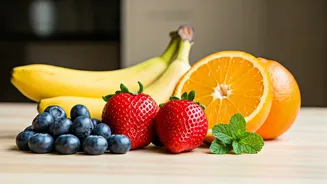Apples: The Classic Choice
Apples, a timeless and universally loved fruit, stand out as excellent providers of dietary fiber, crucial for maintaining a healthy digestive system in children.
Fiber assists in regular bowel movements, preventing constipation and ensuring the gut functions efficiently. Beyond fiber, apples provide essential vitamins such as Vitamin C, which fortifies the immune system, and antioxidants that help shield the body's cells from damage. The natural sugars in apples offer sustained energy, keeping kids active and focused throughout the day. Offering apples in various forms, from fresh slices to applesauce, can make them a regular, enjoyable part of a child's diet. Apples are a simple way to incorporate necessary nutrients and fiber.
Blueberries: Brain Boosters
Blueberries are not just delicious; they are also nutritional powerhouses, loaded with antioxidants known to support brain health. These antioxidants combat free radicals, which can harm brain cells, and protect the brain from oxidative stress. Consuming blueberries can improve memory and cognitive function in children, making them an excellent choice for kids. Blueberries also deliver vital vitamins like Vitamin K, which contributes to bone health and blood clotting, and Vitamin C, which strengthens the immune system. Their small size makes them easy for kids to eat, whether by the handful or sprinkled onto cereal or yogurt. Including blueberries regularly is a tasty way to enhance cognitive performance and general wellness in kids.
Bananas: Energy and Potassium
Bananas, being a widely accessible fruit, are an excellent source of quick, natural energy due to their carbohydrate content. The carbohydrates present in bananas are broken down gradually, providing a steady release of energy that sustains kids throughout their daily activities. Additionally, bananas are packed with potassium, an essential mineral that supports healthy heart function and muscle strength. Potassium also helps maintain fluid balance, crucial for overall well-being. The fruit is easy for small hands to manage, and its portability makes it a convenient snack for school or outings. Bananas are a convenient and nutritious option for active children.
Oranges: Immune Support
Oranges are renowned for their high Vitamin C content, a vital nutrient for boosting the immune system. Vitamin C helps the body create more white blood cells, which combat infections and protect against illnesses. Besides Vitamin C, oranges supply additional antioxidants that work to protect cells from damage. Oranges also offer fiber, aiding digestion, and they are hydrating due to their high water content. The vibrant color and sweet taste make oranges appealing to kids, and they can be served as slices, in juice (with limited sugar), or added to fruit salads. Including oranges in your child's diet is an effective way to strengthen the immune system and support overall health.
Strawberries: Antioxidant Rich
Strawberries are not just delicious; they are also packed with antioxidants, which are crucial for protecting the body against damage from free radicals. Antioxidants help boost the immune system and promote overall health. Moreover, strawberries provide a significant amount of Vitamin C, boosting immunity and preventing illness. Fiber is also present, which supports healthy digestion and regular bowel movements. Their appealing red color and sweet taste make strawberries a favorite among children. Strawberries can be added to breakfast cereals, fruit salads, or enjoyed as a quick snack. Regularly eating strawberries offers numerous health benefits and enhances a child's diet.
Mangoes: Vitamin Powerhouse
Mangoes are packed with vitamins and minerals, specifically Vitamin A, essential for vision, and Vitamin C, for immune support. They offer a good amount of fiber, contributing to healthy digestion and regular bowel function. Mangoes also contain various antioxidants that work to protect the body against cell damage. The natural sweetness and rich flavor of mangoes make them a delightful treat for kids. They can be enjoyed fresh, in smoothies, or in fruit salads. Incorporating mangoes into a child's diet provides essential nutrients and enhances both their palate and overall health. Mangoes are a nutritious and delicious addition to any meal plan.
Grapes: Easy and Healthy
Grapes offer a convenient and easy-to-eat option, providing various health benefits. They are a good source of antioxidants, like resveratrol, which can support cardiovascular health. Grapes contain essential vitamins and minerals, contributing to overall health. Their small size makes them easy for children to eat, and they are enjoyed fresh, frozen, or added to salads. The variety of colors—green, red, and black—adds visual appeal, encouraging kids to consume them. Including grapes is a straightforward way to provide antioxidants and vital nutrients for a child’s health. Grapes present an excellent, healthy choice for a quick snack or meal addition.
Kiwi: Nutrient-Dense Choice
Kiwis are a nutrient-dense fruit, providing a wide array of vitamins and minerals crucial for a child's health. They are an excellent source of Vitamin C, bolstering the immune system and helping the body fight off illnesses. They also contain fiber, promoting digestive health and regulating bowel movements. Kiwis offer Vitamin K, crucial for blood clotting, and Vitamin E, which is an antioxidant. Their unique flavor profile and vibrant green color add diversity to a child's diet. Kiwis are great as is or mixed into fruit salads, adding both nutrition and an exciting taste. Regular consumption of kiwis can contribute to improved overall health and well-being for kids.
Pears: Gentle Digestion
Pears offer a gentle and effective way to support digestion in children. They contain dietary fiber, which helps promote regular bowel movements and prevents constipation. The fiber in pears can also contribute to a feeling of fullness, aiding in appetite control. Furthermore, pears provide essential vitamins like Vitamin C, crucial for immune health, and antioxidants that help safeguard the body's cells. Their soft texture and sweet taste make pears a welcome addition to a child's diet. Pears can be enjoyed sliced, pureed, or as part of a meal. Including pears in a child's diet can enhance digestion and add essential nutrients. It is a nutritious and easily digestible choice.
Avocado: Healthy Fats
Avocados, though often seen as a vegetable, are fruits that bring healthy fats to the table, which are crucial for brain development and overall growth. These fats help in the absorption of fat-soluble vitamins and support the structure of brain cells. Avocados are rich in essential vitamins like Vitamin K, which contributes to bone health, and potassium, which supports proper muscle function. They are versatile, easy to incorporate into various meals. They can be added to smoothies, mashed and spread on toast, or mixed with other fruits. Regularly incorporating avocados into a child's diet supplies vital nutrients, aids brain development, and provides sustained energy. They are a nutritious and flexible option for children.



















